A CKNOWLEDGMENTS Thanks to Neil Nelson, a special friend and wonderful poet, whose interest in my first draft of the early poems encouraged me to continue when confidence started to fail. Neil is greatly responsible for teaching me how to listen to and hear these ancient voices. Thanks to Tony Connor, who read through my early draft of the first half of this text. Tony, an accomplished poet, had little exposure to Asian poetry. His thorough reading and candid comments helped me in a way that no enthusiast for Asian literature could match. Gene Smith of Wisdom Publications sent the manuscript to James Sanford.
Professor Sanfords comments were invaluable to me as I revised the text. Robert Aitken, Roshi of the Honolulu Diamond Sangha, sent me copies of Nyogen Sensaki Senseis renditions of some of Jakushitsus poems; renditions which helped me rethink some of my interpretations of the less accessible poems. Aitken Roshi has always been generous with his time and effort and I am grateful. Nobody has had to answer more questions about obscure passages in the Japanese text than my wife Hiroko, Her patience and perceptiveness have kept me going more than anything else. Finally I thank our daughter, Nao, for her comments to my readings of some of the poems.
Contents

Calligraphy by Jakushitsu.
His most famous poem: Wind stirs waterfall...
(translation on page )
First published in 2000 by Tuttle Publishing, an imprint of Periplus Editions (HK) Ltd, with editorial offices at 364 Innovation Drive, North Clarendon, VT 05759 U.S.A.
Contents

Calligraphy by Jakushitsu.
His most famous poem: Wind stirs waterfall...
(translation on page )
First published in 2000 by Tuttle Publishing, an imprint of Periplus Editions (HK) Ltd, with editorial offices at 364 Innovation Drive, North Clarendon, VT 05759 U.S.A.
Copyright 2000 Arthur Braverman All rights reserved. No part of this publication may be reproduced or utilized in any form or by any means, electronic or mechanical, including photocopying, recording, or by any information storage and retrieval system, without prior written permission from Tuttle Publishing. Library of Congress Cataloging-in-Publication Data Jakushitsu Genko, 1290-1367. A quiet room: the poetry of Zen Master Jakushitsu / Arthur Braverman. p. cm.
ISBN: 0-8048-3213-7 (pbk.); ISBN: 978-1-4629-1704-4 (ebook) 1. Zen poetry, Japanese. 1. Braverman, Arthur, 1942- 11. Title. PL792.J35 Q85 2000 895.6'122--dc21 00-020087 Distributed by USA Tuttle Publishing
Distribution Center
Airport Industrial Park
364 Innovation Drive
North Clarendon, VT 05759-9436
Tel; (802) 773-8930
Tel: (800) 526-2778
www.tuttlepublishing.com C ANADA Raincoast Books
8680 Cambie Street
Vancouver, British Columbia
V6P 6M9
Tel: (604) 323-7100
Fax; (604) 323-2600 J APAN Tuttle Publishing
Yaekari Building 3rd Floor, 5-4-12
Osaki Shinagawa-ku,
Tokyo 141-0032
Tel; (03) 5437-0171
Fax: (03) 5437-0755 S OUTHEAST A SIA Berkeley Books Pte Ltd
61 Tai Seng Avenue, #02-12
Singapore 534167
Tel; (65) 280-1330
Fax; (65) 280-6290
www.periplus.com First edition 06 05 04 03 02 01 00 10 98 7 6543 2 1 Design by Stephanie Doyle Printed in the United States of America

D EDICATION To the Memory of Three Good Friends (Good Friend, zen chishiki in Japanese, is an expression for teacher in Zen Buddhism) Abe Kirschner
Adrienne Stalman Assail
Ichiro Shirato Sensei
Footnotes
.
The poems in this part were taken from Nihon no zen goroku, vol. 10, and Kokuyaku Eigen]akushitsu Dsho Goroku. See note 2 of the Introduction. . Wu-men Kuan (Japanese: Mumonkan), The Gateless Gate, is a collection of forty-eight cases (kans) that appeared at the end of the Sung period (1229). The kans in this collection are still widely used in Zen monasteries today.
This collection has been translated into English more than any other. Two outstanding English translations still available are Zen Comments on the Mumonkan by Zenkei Shibayama (San Francisco: Harper & Row, 1974) and The Gateless Barrier by Robert Aitken (San Francisco: North Point Press, 1990). . There is a Rinzai temple called Konzji in the mountains near the village of Ota in the Town of Tant in the district of Deishi in Hygo Prefecture. There was a place called Ota Manor in the ancient province of Tajima, present-day Hygo Prefecture, where, according to notes in an old edition of the record of Jakushitsu, a place with the characters Konz (pronounced kin no kura) existed. . .
Withered Zen is an expression indicating the destruction of body and mind; a state compared to that of a withered tree: the ideal Zen state. . Narichika Fujiwara. Narichika (1137-1177) was a nobleman killed by Taira no Kiyomori, leader of the Taira clan and virtual dictator of Japan from 1167 to 1185, for plotting against the rulers regime. . Kken is a kind of passport (giving one permission to travel).
Here Jakushitsu appears to play on the meaning, implying that his friend is advanced spiritually and so is sanctioned to go to the capital. . The name of the tomb where Jakushitsu's teacher Yaku was buried. . The teacher of the recluse to whom this poem is written. .
Taijih, sango , or mountain name, for the Zen temple Jikji. . Anjininsan, a peak connected to Taijih (Great Warrior Peak). See Nihon no zen goroku, vol. 10, p. . .
Pi -yen lu (Japanese: Hekiganroku, English: The Blue Cliff Record) is one of the most important kan collections in Zen literature. A collection of a hundred cases (kans) and commentaries originally compiled by Hsueh-tou Chung-hsien in the eleventh century, it was composed in its present form in the twelfth century by Yuan-wu Ko-chin with his own commentaries and introductions to each case. Two English translations presently exist, the most complete rendition by Cleary & Cleary (Shambhala Press, 1978). . Flying through the air on a crane suggests the Taoist image of immortality. Together with the poem that follows, Jakushitsu is pointing to karma that is carried through generations.
I cant figure out the allusion to Yang in both the poem and the quote. . Mountain clouds symbolize wandering monks. . Mus Soseki, more popularly known as the National Teacher Mus (Mus Kokushi in Japanese.) . Ching-te chuan-teng lu (Japanese: Keitokudentroku), the Transmission of the Lamp, is a compendium of Chan (Zen) biographies.
There are two partial translations of this most important record: The Original Teachings of Chan Buddhism (New York: Pantheon, 1966); and The Transmission of the Lamp: Early Masters (Wakefield, N.H.: Longview Academic, 1990). . Jakushitsu probably studied the above conversation in which the Yogacarin Buddhist school idea of a consciousness beyond subject and object was recognized, and he wanted to equate the beautiful aroma of tea to this state of consciousness. It is beyond subject/object or form and function. . . .
Jitsu was a disciple in the line of Rankei Dry, the teacher of Jakushitsus teacher Yaku. He was the fourth abbot of Jmyji, one of the five major gozan monasteries in Kamakura. . The name of the pavillion where Daikakus ashes lie. Jakushitsu uses Seirai to mean Daikaku Zenji (Patriarch from the West). . .
A reference to the pre-Tang poet Tao Yuan-mings Seeing the tired bird, I realized it was time to return. . These images of the rarity of true dharma (mani pearl) hidden deep within us (Tathgata storehouse) come from Yung-chia Hsuan-chiaos Cheng-tao Ke (Song of Enlightenment). The passages from which these images were taken are The whereabouts of the precious mani-jewel is not known to people generally, Which lies deeply buried in the recesses of the Tathagata storehouse (translation taken from D. T. 91). 91).

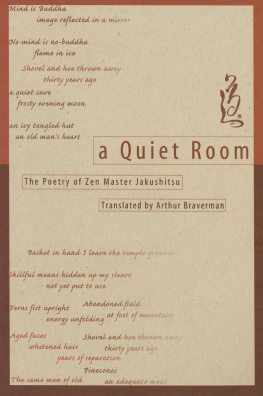
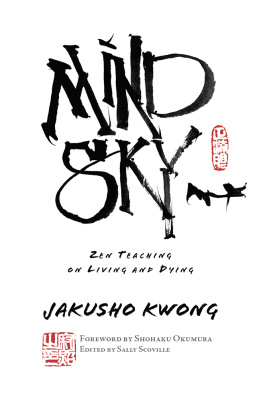
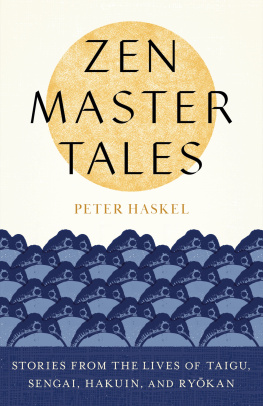

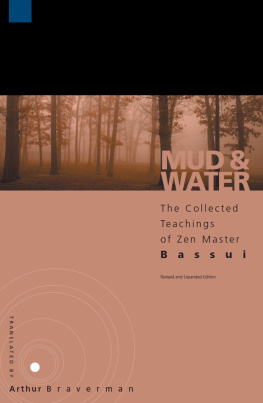

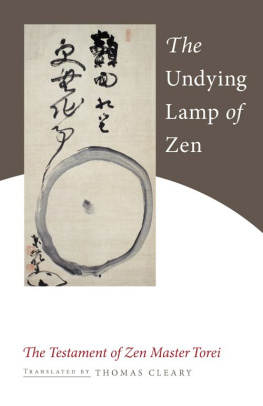
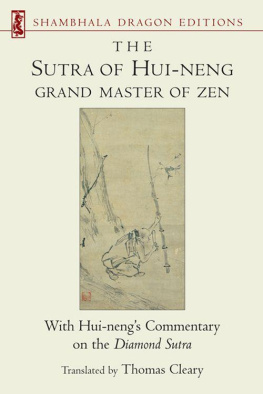
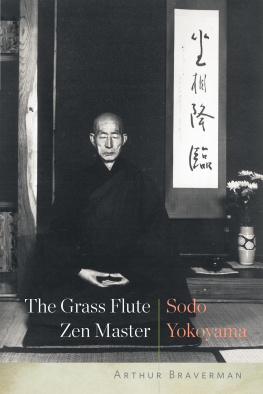
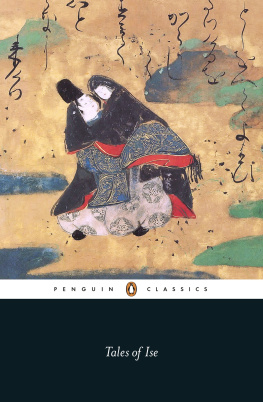

 Calligraphy by Jakushitsu.
Calligraphy by Jakushitsu.